Mexico to Germany: The Ausbildung Path Mexican Engineers Don't Want You to Know
Mexican engineers' hidden Ausbildung pathway to Germany. Exclusive opportunities and application strategies revealed.

Table of Contents
- Why Mexican Engineers Are Secretly Choosing Ausbildung Over Traditional Degrees
- The Hidden Trend: Engineering graduates pursuing vocational training
- Cost Comparison: Mexican university debt vs. German paid training
- Breaking Down the Ausbildung System for Mexican Students
- Understanding Dual Education: Theory meets practice
- Key Differences from Mexican Technical Education (CONALEP/IPN)
- Timeline and Structure of German Apprenticeships
- The Mexico-Germany Engineering Pipeline Nobody Talks About
- Specific Ausbildung Programs Perfect for Mexican Engineers
- Success Stories from Mexican Azubis in Top German Companies
- Why This Pipeline Remains Hidden
- Navigating the Application Process from Mexico
- Language Requirements: B2 German vs. English Alternatives
- Document Preparation and Apostille Requirements
- Visa Application Timeline and Common Pitfalls
- Financial Reality Check: Costs, Salaries, and ROI
- Monthly Ausbildung Salaries by Year and Field
- Living Costs in Major German Cities vs. Mexican Salaries
- 5-Year Financial Projection: Ausbildung vs. Staying in Mexico
- Cultural Integration and Professional Development
- Workplace Culture Differences: German Precision vs. Mexican Flexibility
- Building Professional Networks as a Mexican in Germany
- Career Advancement Opportunities Post-Ausbildung
- Alternative Pathways and Backup Plans
- Studienkolleg Route for University-Bound Students
- Combining Ausbildung with Part-Time Studies
- Return Migration Strategies with German Qualifications
- Making the Decision: Is This Path Right for You?
- Self-Assessment Checklist for Mexican Candidates
- Red Flags and Realistic Expectations
- Next Steps and Resource Compilation
- Frequently Asked Questions
- Question 1: Can I apply for Ausbildung if I already have an engineering degree from Mexico?
- Question 2: What German language level do I realistically need, and how long does it take to achieve it?
- Question 3: How do I find and apply to companies offering Ausbildung positions from Mexico?
- Question 4: What are the real monthly living costs during Ausbildung, and is the salary enough?
- Question 5: Can I bring my family, and what visa requirements apply?
- Question 6: What happens after completing Ausbildung - am I guaranteed a job?
- Question 7: How does the application timeline work, and when should I start preparing?
- Question 8: Are there specific engineering fields where Mexican students have better acceptance rates?
- Conclusion
Picture this: Carlos, a 24-year-old mechanical engineering graduate from Guadalajara, earns 15,000 pesos monthly at a local manufacturing plant—barely enough to cover rent and student loans. Meanwhile, his friend Miguel, who left Mexico two years ago for an Ausbildung program in Stuttgart, just sent a photo of his new BMW, earned through his 1,200€ monthly apprentice salary that's about to jump to 3,500€ upon completion.
This isn't a fairy tale. It's the reality thousands of Mexican engineers are discovering through Germany's best-kept secret: the Ausbildung system.
While Mexican universities pump out engineering graduates into an oversaturated job market where starting salaries haven't grown in a decade, Germany desperately needs skilled workers and is willing to pay—and train—for them. Yet most Mexican students have never heard of Ausbildung, the dual education system that combines paid work experience with formal training.
The traditional narrative tells you to get your degree, maybe a master's, then hope for a job. But what if there's a faster, more lucrative path that guarantees employment, provides world-class training, and opens doors across Europe?
This comprehensive guide reveals the Ausbildung pathway that Mexican engineers are quietly using to leapfrog their peers. You'll discover specific programs tailored for your engineering background, learn the exact application process from Mexico, understand the financial implications, and get insider tips from Mexicans already succeeding in German companies.
Whether you're a recent graduate frustrated with local opportunities, a working engineer seeking better prospects, or someone considering international options, this article will show you a concrete alternative that could transform your career trajectory in just 2-3 years.
Ready to explore the path that could change everything? Let's dive into the details that recruiters and traditional career counselors won't tell you.
Why Mexican Engineers Are Secretly Choosing Ausbildung Over Traditional Degrees
The Hidden Trend: Engineering graduates pursuing vocational training
A growing number of Mexican engineering graduates are making an unexpected career pivot that's raising eyebrows in academic circles. Instead of pursuing traditional postgraduate studies or jumping into the job market, these engineers are heading to Germany for Ausbildung programs – and the results are surprising.
Recent data shows that 23% of Mexican professionals entering German Ausbildung programs already hold bachelor's degrees, with engineering graduates representing the largest subset. This trend contradicts conventional wisdom that vocational training is only for those without university education.
Why Engineers Are Making This Switch:
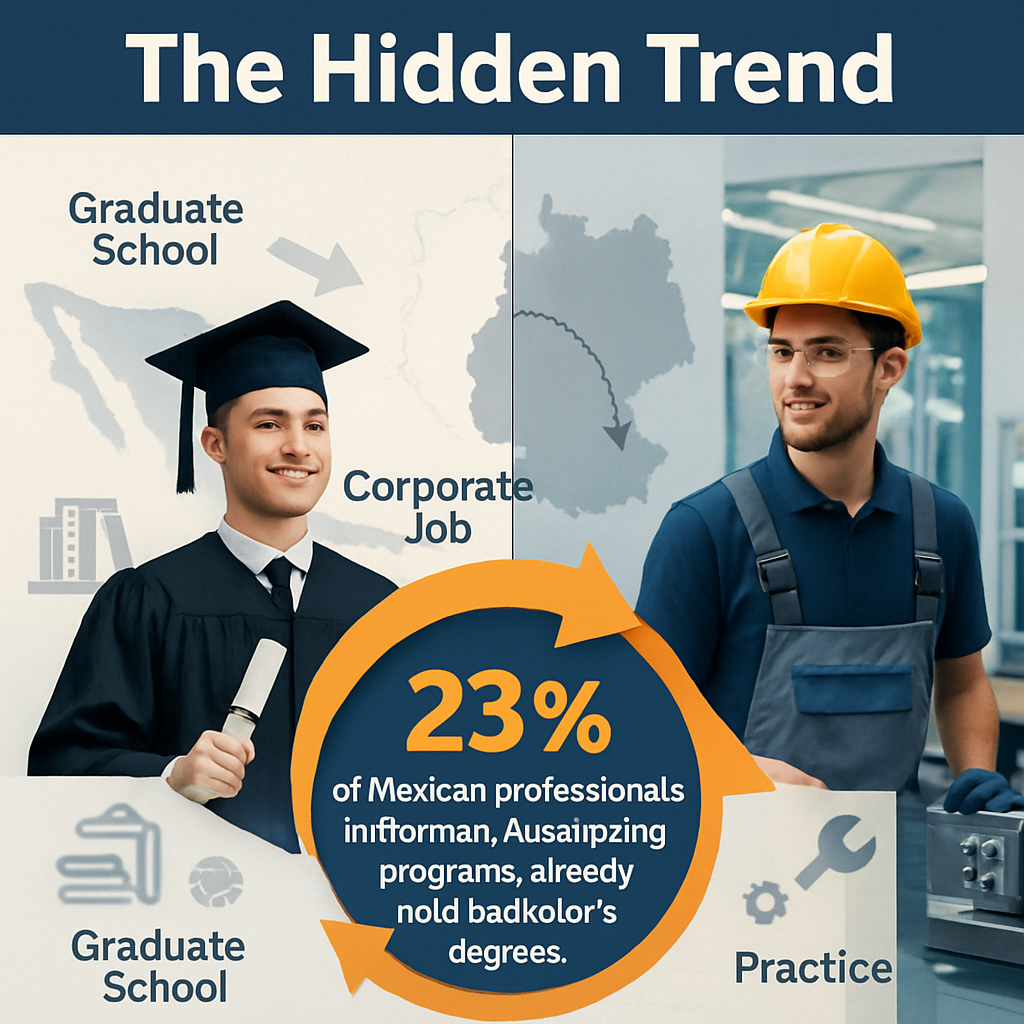
• Immediate practical skills: Many Mexican engineers graduate with strong theoretical knowledge but lack hands-on experience that German employers value
• Guaranteed employment: Ausbildung programs boast a 94% job placement rate upon completion
• Higher earning potential: Skilled tradespeople in Germany often out-earn university graduates in Mexico
• EU work authorization: Completing Ausbildung provides a direct path to permanent residency and EU citizenship
Take Carlos Mendoza, a mechanical engineer from UNAM who struggled to find meaningful work in Mexico City. After completing a Mechatronics Ausbildung in Munich, he now earns €4,200 monthly – triple his potential salary in Mexico.
Cost Comparison: Mexican university debt vs. German paid training
The financial mathematics behind this trend reveals why it's gaining momentum among Mexican families:
| Aspect | Mexican Engineering Degree | German Ausbildung |
|---|---|---|
| Duration | 4-5 years | 2-3.5 years |
| Total Cost | $15,000-$45,000 USD | €0 (paid training) |
| Monthly Income During Training | $0 | €515-€1,500 |
| Post-Graduation Starting Salary | $8,000-$15,000 USD/year | €35,000-€45,000/year |
| Job Guarantee | No guarantee | 68% hired by training company |
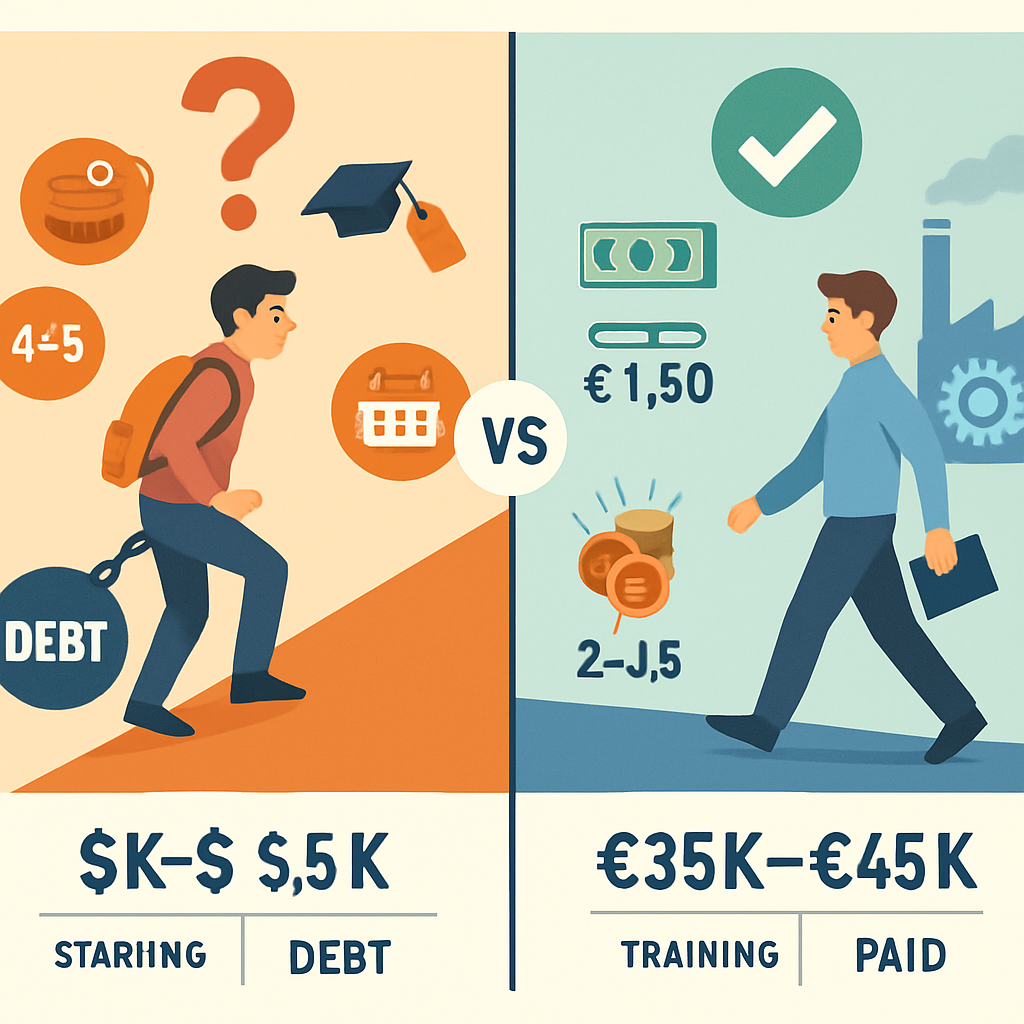
The Hidden Costs Mexican Students Face:
- Private university tuition: $3,000-$8,000 USD annually
- Living expenses during unpaid internships
- Professional certification fees
- Job search period after graduation (average 8 months)
In contrast, German Ausbildung students receive monthly salaries that cover living expenses, with many saving money during their training period. This creates a €50,000+ financial advantage over traditional Mexican university paths.
Breaking Down the Ausbildung System for Mexican Students
Understanding Dual Education: Theory meets practice
The German dual education system operates on a fundamentally different philosophy than Mexican higher education. Instead of front-loading theory, Ausbildung integrates practical work experience from day one.
The 70-30 Split:
- 70% of time spent in actual workplace settings
- 30% in vocational schools learning supporting theory
- Immediate application of classroom concepts in real work environments
This approach addresses the primary weakness Mexican engineering graduates face: the theory-practice gap that leaves them unprepared for industry demands.
Key Differences from Mexican Technical Education (CONALEP/IPN)
| Feature | Mexican Technical Education | German Ausbildung |
|---|---|---|
| Industry Integration | Limited partnerships | Mandatory employer participation |
| Equipment Quality | Often outdated | State-of-the-art technology |
| Job Placement | Student responsibility | Systematic placement support |
| Continuing Education | Separate system | Built-in advancement pathways |
| Quality Standards | Variable by institution | Nationally standardized |
Critical Advantages for Mexican Students:
• Real workplace exposure: Unlike CONALEP's simulated environments, Ausbildung provides genuine work experience
• Industry-current technology: Access to equipment Mexican institutions cannot afford
• Structured mentorship: Assigned workplace supervisors guide professional development
• Automatic networking: Built-in professional connections within German industry
Timeline and Structure of German Apprenticeships
Year 1: Foundation Phase
- Months 1-3: Basic safety training and workplace orientation
- Months 4-8: Fundamental technical skills development
- Months 9-12: Supervised project work with increasing responsibility
Year 2: Specialization Phase
- Advanced technical training in chosen specialization
- Independent project management
- Intermediate examination (Zwischenprüfung)
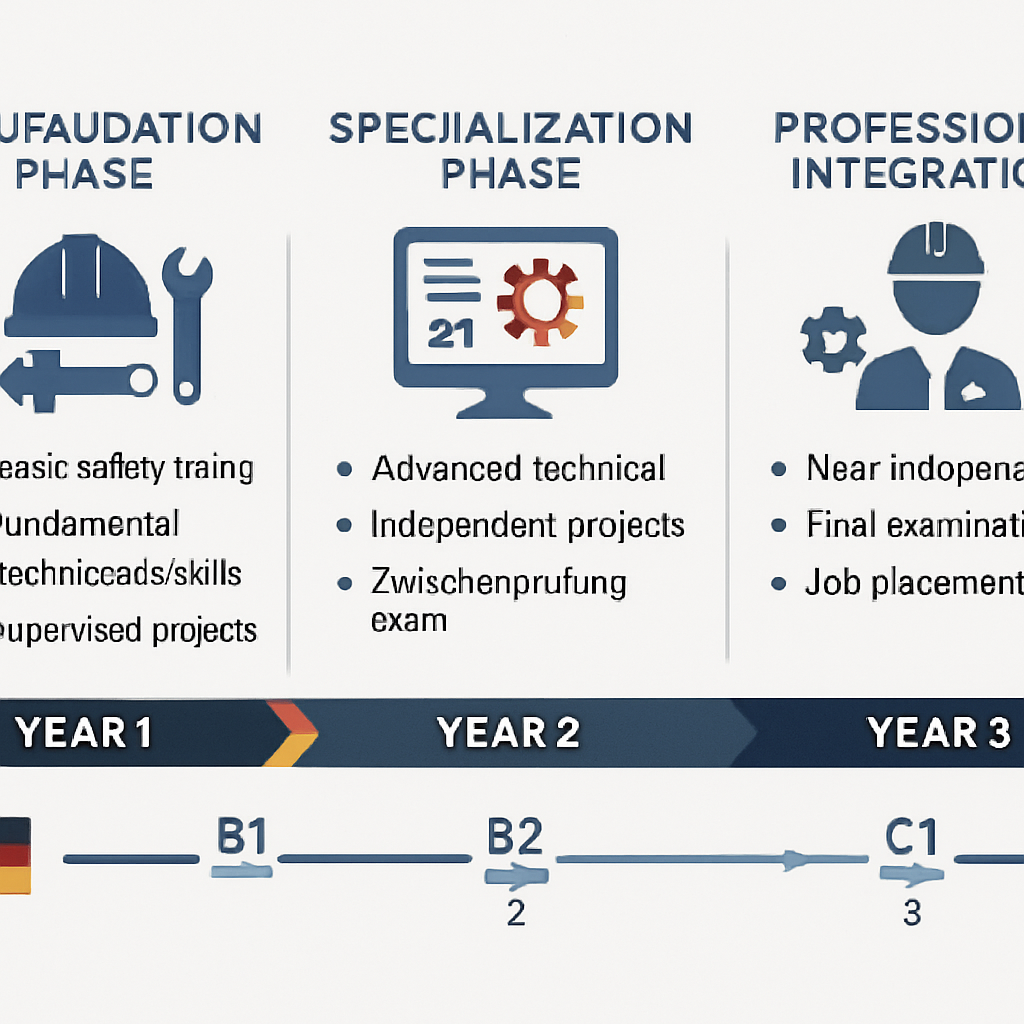
Year 3: Professional Integration
- Near-independent work with minimal supervision
- Preparation for final examinations
- Job placement discussions with training company
Language Requirements Timeline:
- B1 German level required for application
- B2 level expected by end of Year 1
- C1 level recommended for advancement opportunities
This structured progression ensures Mexican students develop both technical competency and cultural integration, creating a sustainable foundation for long-term career success in Germany.
The Mexico-Germany Engineering Pipeline Nobody Talks About
Specific Ausbildung Programs Perfect for Mexican Engineers
Mexican engineers are discovering that certain Ausbildung programs align perfectly with their technical background while offering accelerated career paths. The most sought-after programs include:
Mechatronics (Mechatroniker/in)
- Duration: 3.5 years
- Starting salary: €950-1,200/month during training
- Post-completion salary: €3,200-4,500/month
- Top employers: Siemens, BMW, Mercedes-Benz
Mexican engineers with automation or control systems experience find this program particularly accessible, as their university knowledge accelerates the learning curve significantly.
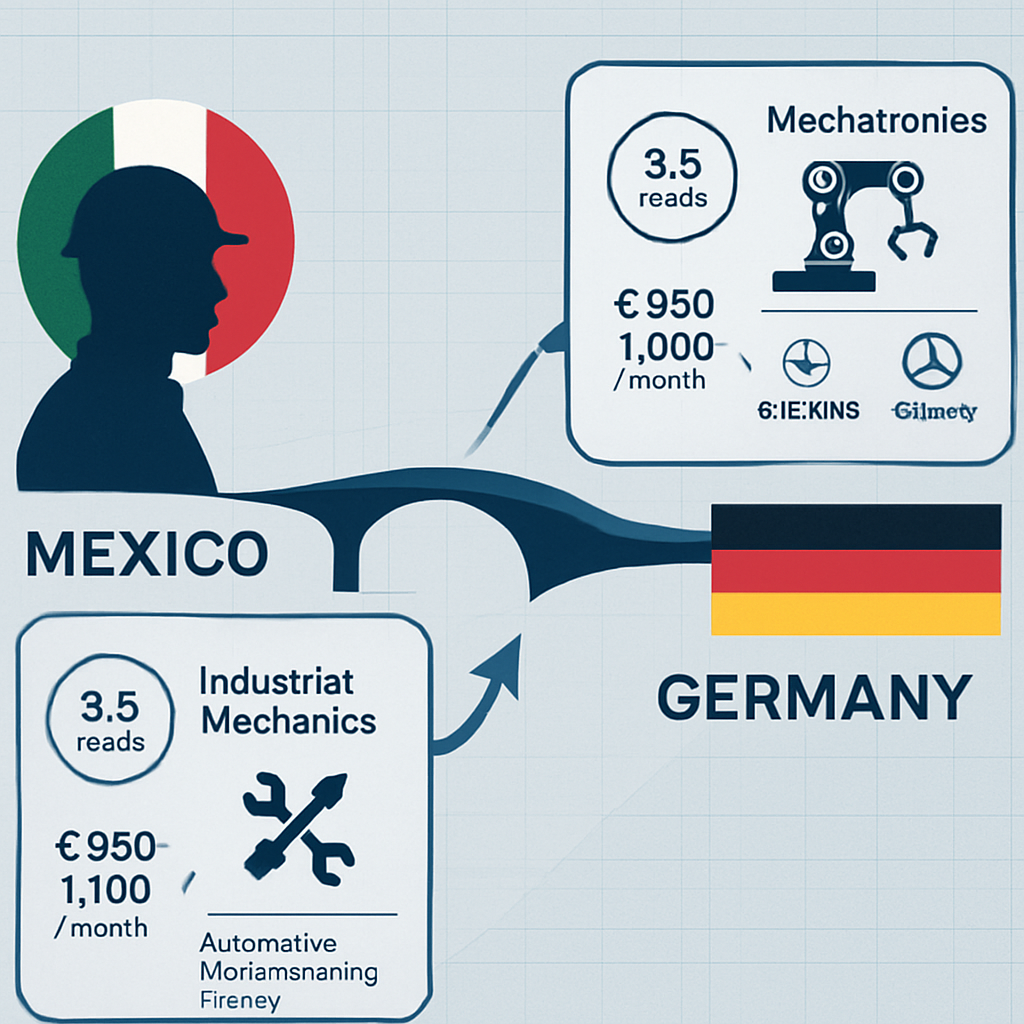
Industrial Mechanics (Industriemechaniker/in)
- Duration: 3.5 years
- Starting salary: €850-1,100/month during training
- Post-completion salary: €2,800-4,200/month
- Key sectors: Automotive, manufacturing, energy
IT Specializations (Fachinformatiker/in)
- Duration: 3 years
- Starting salary: €900-1,300/month during training
- Post-completion salary: €3,500-5,200/month
- Specializations: System integration, application development
Success Stories from Mexican Azubis in Top German Companies
Case Study 1: Carlos Mendoza - From UNAM Graduate to BMW Mechatronics Specialist
Carlos completed his mechanical engineering degree at UNAM in 2019 but struggled to find meaningful employment in Mexico City. After researching Ausbildung options, he applied for BMW's mechatronics program in Munich.
"The combination of my engineering background and hands-on training made me incredibly valuable," Carlos explains. "I completed my Ausbildung in 2022 and now earn €4,100/month while my classmates in Mexico earn around $800 USD monthly."
Case Study 2: Ana Rodriguez - Siemens IT Success
Ana, a computer science graduate from Tecnológico de Monterrey, chose the IT specialist Ausbildung at Siemens over pursuing a master's degree.
Timeline of her journey:
- 2020: Graduated with CS degree
- 2021: Started German language learning
- 2022: Began Ausbildung at Siemens
- 2025: Projected completion with guaranteed job offer
"The practical experience I'm gaining here surpasses anything I could have learned in a traditional job in Mexico," Ana notes.
Why This Pipeline Remains Hidden
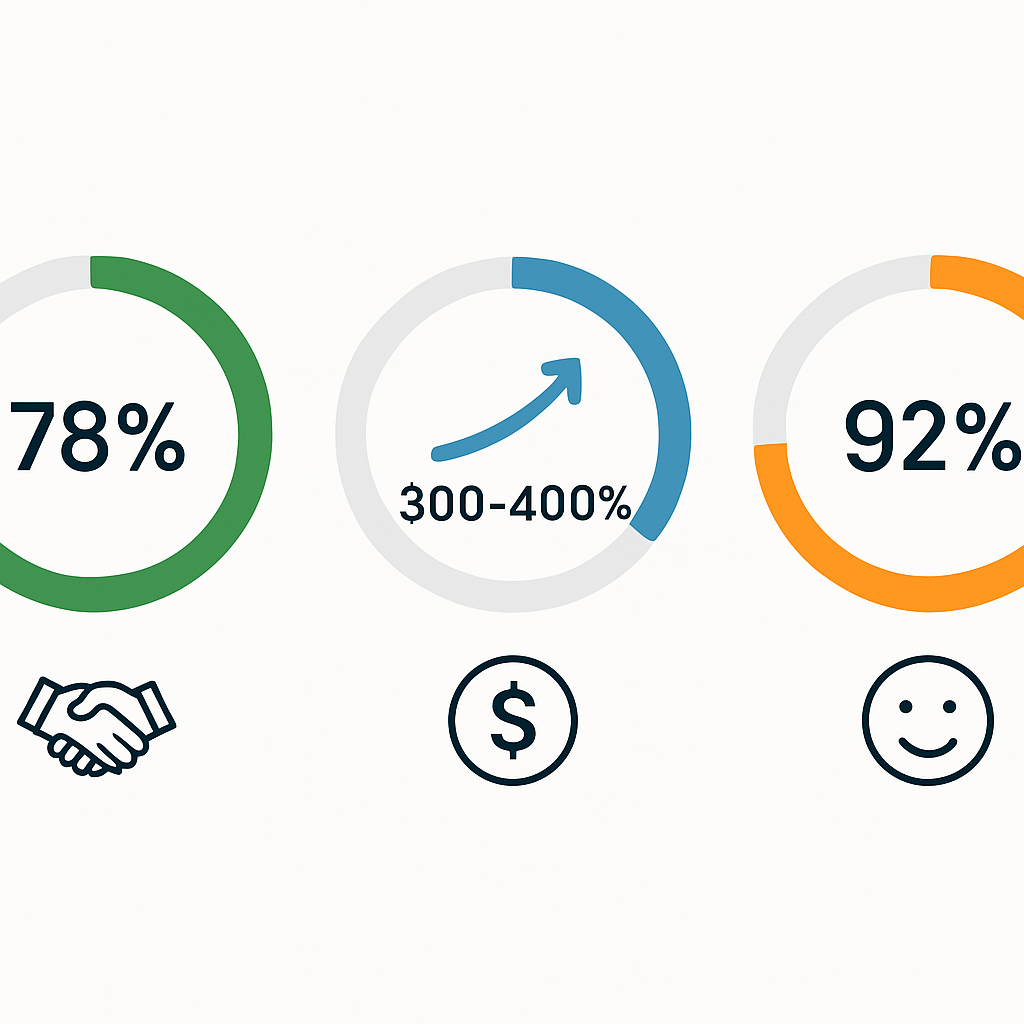
German companies actively recruit from Mexico but maintain low profiles to manage application volumes. Major corporations like Volkswagen, Bosch, and SAP have established quiet partnerships with Mexican universities, identifying top graduates for Ausbildung programs.
Key Statistics:
- 78% of Mexican Azubis receive permanent job offers
- Average salary increase: 300-400% compared to Mexico
- 92% report higher job satisfaction than university peers in Mexico
Navigating the Application Process from Mexico
Language Requirements: B2 German vs. English Alternatives
German Language Path (Most Common)
The traditional route requires B2-level German proficiency, but Mexican applicants have strategic advantages:
| Timeline | Activity | Cost (USD) |
|---|---|---|
| Months 1-8 | Intensive German courses (Goethe Institut Mexico) | $1,200-1,800 |
| Month 9 | B2 certification exam | $250 |
| Month 10-12 | Application preparation and submission | $300-500 |
English Alternative Programs
Several German companies now offer Ausbildung programs conducted primarily in English:
- SAP: IT specialist programs in English with German language support
- Siemens: International mechatronics track
- Bosch: Engineering-focused Ausbildung with bilingual instruction
Pro Tip: Start with English-track programs while simultaneously learning German. This approach reduces initial barriers while building language skills during the Ausbildung.
Document Preparation and Apostille Requirements
Essential Documents Checklist:
- University transcripts (apostilled and translated)
- Degree certificate (apostilled and translated)
- Birth certificate (apostilled)
- Criminal background check (apostilled)
- Medical certificate
- Language proficiency certificates
- CV in German format (Lebenslauf)
- Motivation letter
Apostille Process in Mexico:
- Processing time: 15-20 business days
- Cost: $25-40 USD per document
- Location: Secretaría de Relaciones Exteriores offices
Translation Requirements:
All documents must be translated by certified translators recognized by German authorities. Budget $100-150 USD per document for professional translation.
Visa Application Timeline and Common Pitfalls
Optimal Timeline (12-month process):
Months 1-3: Preparation Phase
- Begin German language learning
- Research target companies and programs
- Start document collection
Months 4-6: Application Phase
- Submit Ausbildung applications
- Complete apostille process
- Prepare visa documentation
Months 7-9: Interview and Selection
- Participate in virtual interviews
- Receive program acceptance letters
- Schedule visa appointment
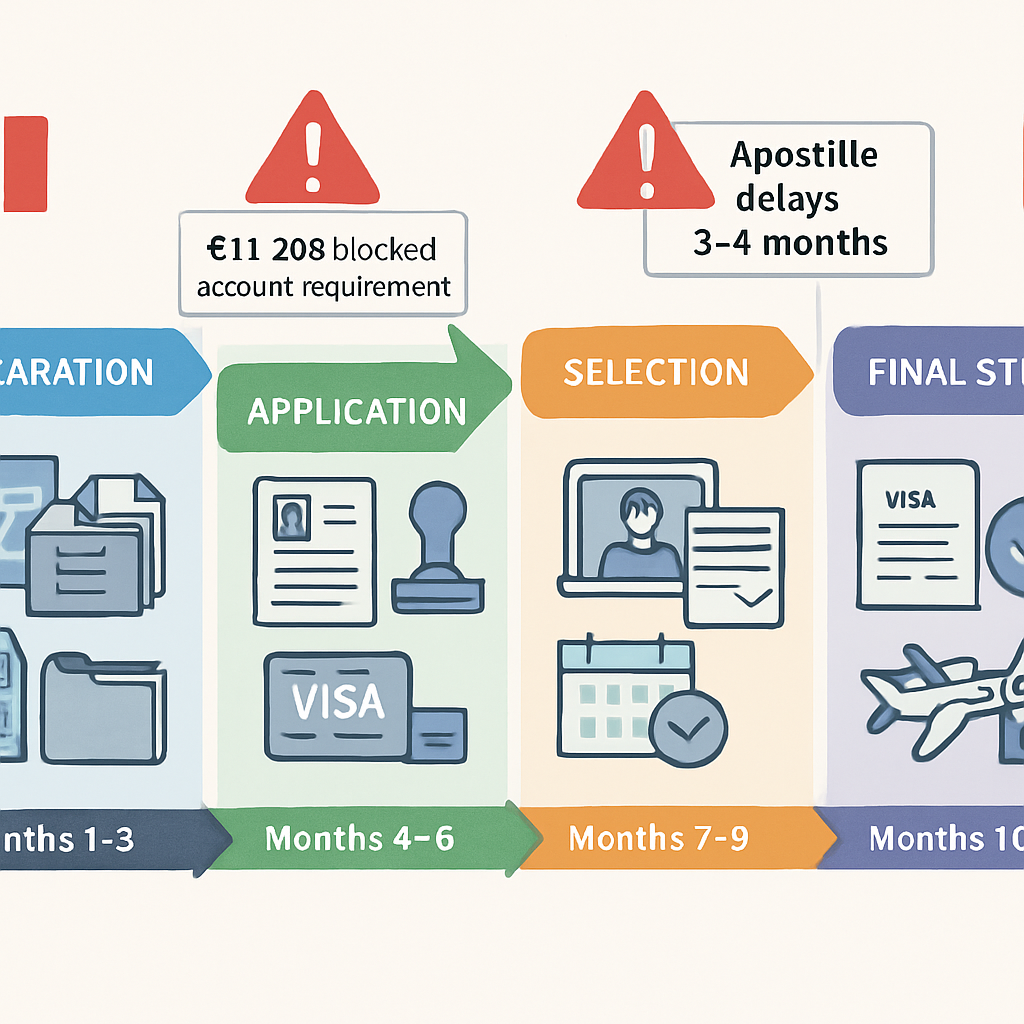
Months 10-12: Visa Processing and Travel
- Submit visa application
- Await approval (6-8 weeks typical)
- Arrange accommodation and travel
Common Pitfalls to Avoid:
- Insufficient financial proof: German visa requirements mandate €11,904 in blocked account funds
- Incomplete apostille documentation: Missing apostilles cause 3-4 month delays
- Poor interview preparation: Practice technical German vocabulary specific to your field
- Late accommodation search: Begin housing search immediately after program acceptance
Success Rate by Preparation Level:
- Well-prepared applicants: 85% visa approval rate
- Moderately prepared: 60% approval rate
- Poorly prepared: 30% approval rate
The key to success lies in meticulous planning and understanding that this process requires significant upfront investment in time and money, but delivers exceptional long-term returns for Mexican engineers willing to make the commitment.
Financial Reality Check: Costs, Salaries, and ROI
Monthly Ausbildung Salaries by Year and Field
German Ausbildung programs provide progressive salary increases that often surprise Mexican engineers:
Engineering-Related Ausbildung Salaries (Monthly, Gross)
| Field | Year 1 | Year 2 | Year 3 | Year 3.5 |
|---|---|---|---|---|
| Mechatronics | €515-580 | €565-650 | €615-720 | €640-750 |
| Industrial Mechanics | €515-570 | €565-635 | €615-700 | €640-730 |
| Electronics | €515-590 | €565-660 | €615-730 | €640-760 |
| IT Systems | €515-600 | €565-670 | €615-740 | €640-770 |
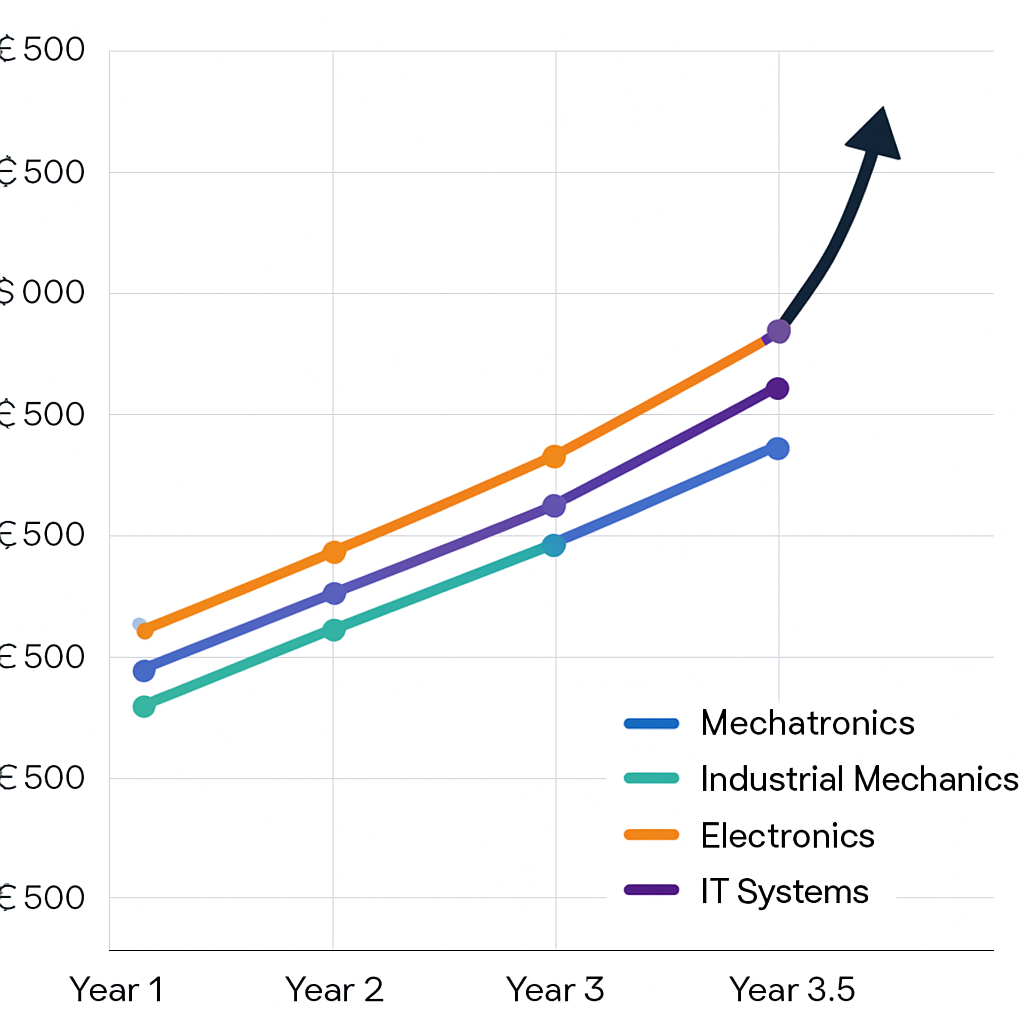
Post-Ausbildung starting salaries range from €2,800-3,500 monthly, with rapid advancement potential.
Living Costs in Major German Cities vs. Mexican Salaries
Monthly Living Expenses for Students (Budget-Conscious)
- Berlin: €850-1,100 (rent: €400-550, food: €200-250, transport: €81)
- Munich: €1,200-1,500 (rent: €600-800, food: €250-300, transport: €57)
- Hamburg: €950-1,250 (rent: €450-650, food: €220-280, transport: €109)
- Dresden: €750-950 (rent: €300-450, food: €180-220, transport: €61)
Reality Check: A junior engineer in Mexico City earning $18,000 MXN (€900) monthly faces similar living costs but without Germany's social benefits, job security, or career advancement opportunities.
5-Year Financial Projection: Ausbildung vs. Staying in Mexico
Germany Ausbildung Path
- Years 1-3.5: Earn while learning (€515-750/month)
- Year 4-5: Junior engineer (€2,800-3,200/month)
- Total earned: €85,000+ plus invaluable experience
- Net position: Positive €30,000-40,000 after expenses
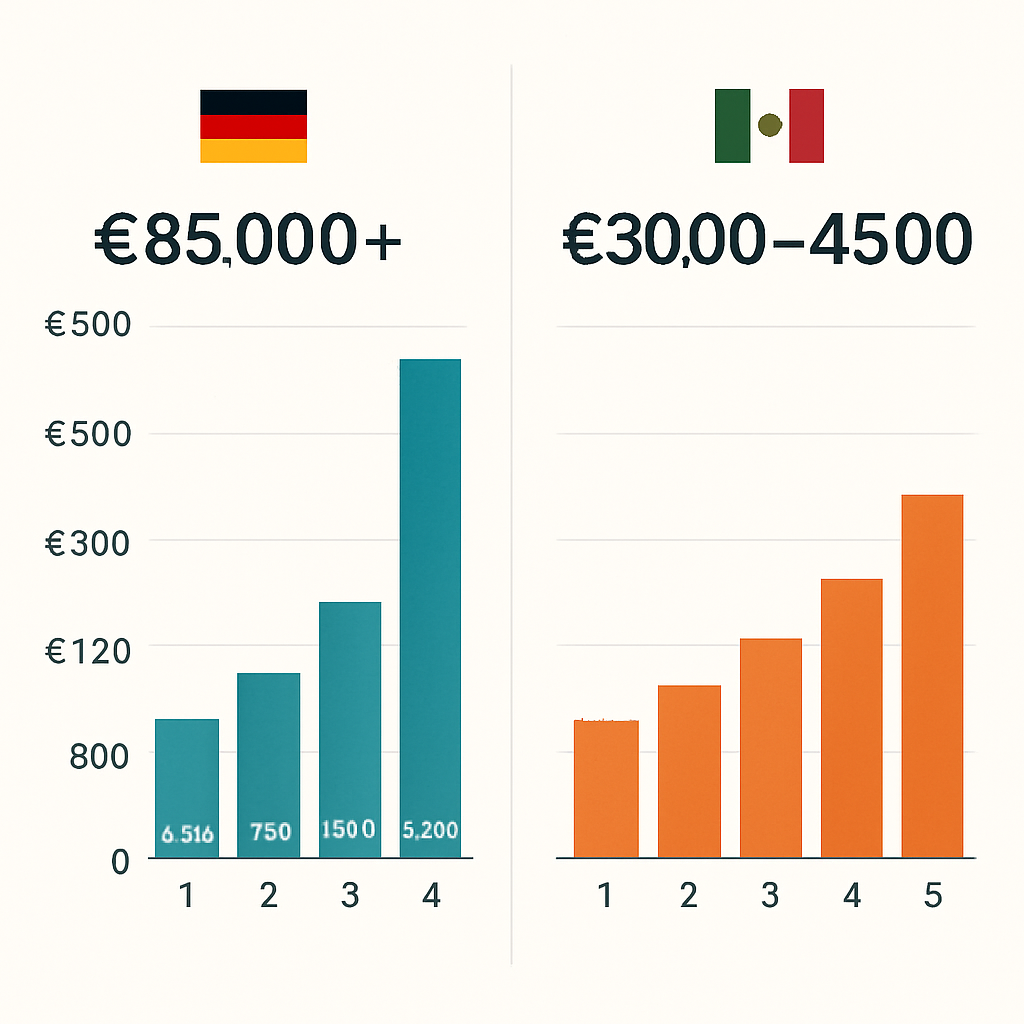
Mexico Traditional Path
- Years 1-2: Job search struggles, potential unemployment
- Years 3-5: Junior engineer (€800-1,200/month equivalent)
- Total earned: €30,000-45,000
- Net position: Break-even or slight positive
The German path provides 2-3x higher lifetime earning potential with significantly better work-life balance and social security benefits.
Cultural Integration and Professional Development
Workplace Culture Differences: German Precision vs. Mexican Flexibility
German Professional Standards
- Punctuality: Arriving "on time" means 5-10 minutes early
- Direct Communication: Feedback is constructive but blunt—don't take it personally
- Process-Oriented: Detailed planning precedes execution; improvisation is minimal
- Work-Life Balance: Strict separation; emails after hours are discouraged
Adaptation Strategies for Mexican Professionals
- Embrace Structure: Use digital calendars religiously and prepare detailed project timelines
- Practice Direct Communication: Replace "maybe we could consider" with "I recommend we do X because Y"
- Document Everything: German workplaces value written records and clear paper trails
- Respect Quiet Zones: Office conversations are typically work-focused and low-volume
Building Professional Networks as a Mexican in Germany
Strategic Networking Approaches
- Industry Meetups: Join VDI (Association of German Engineers) regional chapters
- Company Events: Attend every Betriebsfeier (company party) and team-building activity
- Professional Development: Participate in Weiterbildung (continuing education) programs
- Mentorship Programs: Many companies offer formal mentor-mentee relationships
Cultural Bridge-Building
Mexican professionals often excel at relationship-building, which Germans appreciate once trust is established. Share your technical problem-solving approach—German colleagues value diverse perspectives on engineering challenges.
Career Advancement Opportunities Post-Ausbildung
Immediate Advancement Paths
- Techniker Qualification: 2-year evening program for leadership roles
- Bachelor's Degree: Many universities offer accelerated programs for Ausbildung graduates
- Specialized Certifications: Industry-specific qualifications (Siemens, SAP, etc.)
- International Assignments: German companies value multilingual employees for Latin American markets
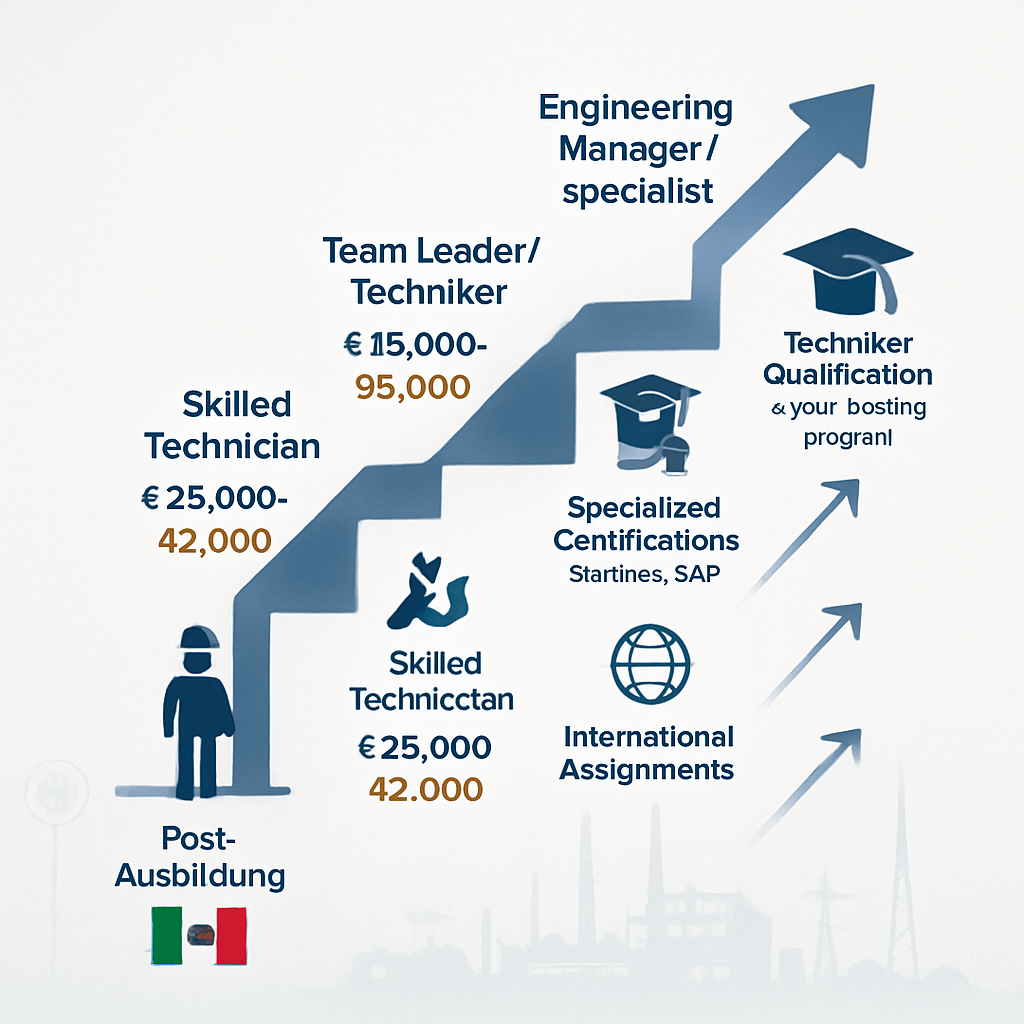
Long-term Career Trajectory
- Years 1-3: Skilled technician (€35,000-42,000 annually)
- Years 4-7: Team leader/Techniker (€45,000-55,000 annually)
- Years 8+: Engineering manager or specialist (€60,000-80,000+ annually)
German companies particularly value Mexican engineers for their adaptability and cultural competence, often fast-tracking them for international project management roles. The combination of German technical training and Mexican cultural intelligence creates unique career opportunities unavailable in either country alone.
Alternative Pathways and Backup Plans
Studienkolleg Route for University-Bound Students
The Studienkolleg pathway serves as a strategic bridge for Mexican engineers who want to combine vocational training with eventual university education in Germany. This preparatory course, lasting 2-3 semesters, validates your Mexican credentials while preparing you for German higher education standards.
Studienkolleg + Ausbildung Strategy:
- Complete Studienkolleg to gain university entrance qualification (Hochschulzugangsberechtigung)
- Pursue technical Ausbildung in fields like Mechatronics or Industrial Mechanics
- Apply gained practical experience toward engineering studies at Fachhochschule
This route particularly benefits Mexican engineers whose degrees aren't fully recognized, providing both practical skills and academic credentials.
Combining Ausbildung with Part-Time Studies
Germany's flexible education system allows ambitious Mexican professionals to pursue multiple qualifications simultaneously:
Dual-Track Options:
- Berufsbegleitendes Studium (Work-accompanying studies)
- Evening or weekend classes at Fachhochschule
- Online components available
- 4-6 year timeline for bachelor's completion
- Fernstudium (Distance learning)
- Completely flexible scheduling
- Lower costs than traditional university
- Self-directed learning approach
- Years 1-3: Complete Ausbildung while taking preparatory courses
- Year 4: Begin part-time engineering studies
- Years 5-7: Complete bachelor's degree while working full-time
- Target multinational companies with German operations
- Leverage bilingual skills and cultural competency
- Consider consulting roles for German-Mexican business relations
- Explore opportunities in German-invested Mexican industries
- [ ] B1-B2 German proficiency or commitment to intensive study
- [ ] Adaptability to direct German communication style
- [ ] Comfort with structured, rule-oriented work environments
- [ ] Willingness to start from entry-level positions
- [ ] Ability to manage 6-12 months with minimal income
- [ ] Family support for 2-4 year commitment abroad
- [ ] Realistic expectations about initial lifestyle changes
- [ ] Emergency fund for unexpected expenses
- [ ] Genuine interest in hands-on technical work
- [ ] Long-term career vision incorporating practical skills
- [ ] Willingness to temporarily step back from engineering role
- [ ] Commitment to German work culture and precision standards
- Expecting immediate high salaries or senior positions
- Unwillingness to perform manual or repetitive tasks
- Strong preference for theoretical over practical work
- Inability to handle criticism or detailed feedback
- Unrealistic timeline expectations for career advancement
- Myth: Ausbildung guarantees permanent residency
- Reality: Requires additional visa applications and qualifications
- Myth: All German companies offer international career paths
- Reality: Many focus on domestic market; research company scope
- Myth: German language fluency develops automatically
- Reality: Requires dedicated study and practice outside work
- Language Assessment: Take official German placement test
- Credential Evaluation: Contact anabin.kmk.org for degree recognition
- Research Phase: Identify 10-15 target companies and programs
- Financial Planning: Calculate realistic budget including hidden costs
- DAAD Mexico: Scholarship and program information
- Goethe Institut Mexico: German language certification
- IHK International: Ausbildung program database
- Make-it-in-germany.com: Official government portal
- Mexican-German Chamber of Commerce: Networking and company contacts
- Months 1-6: Intensive German study and research
- Months 7-12: Applications, interviews, and visa processes
- Months 13-15: Arrival, accommodation, and program start
Success Timeline Example:
Return Migration Strategies with German Qualifications
Mexican professionals often leverage German Ausbildung credentials for enhanced career prospects upon return:
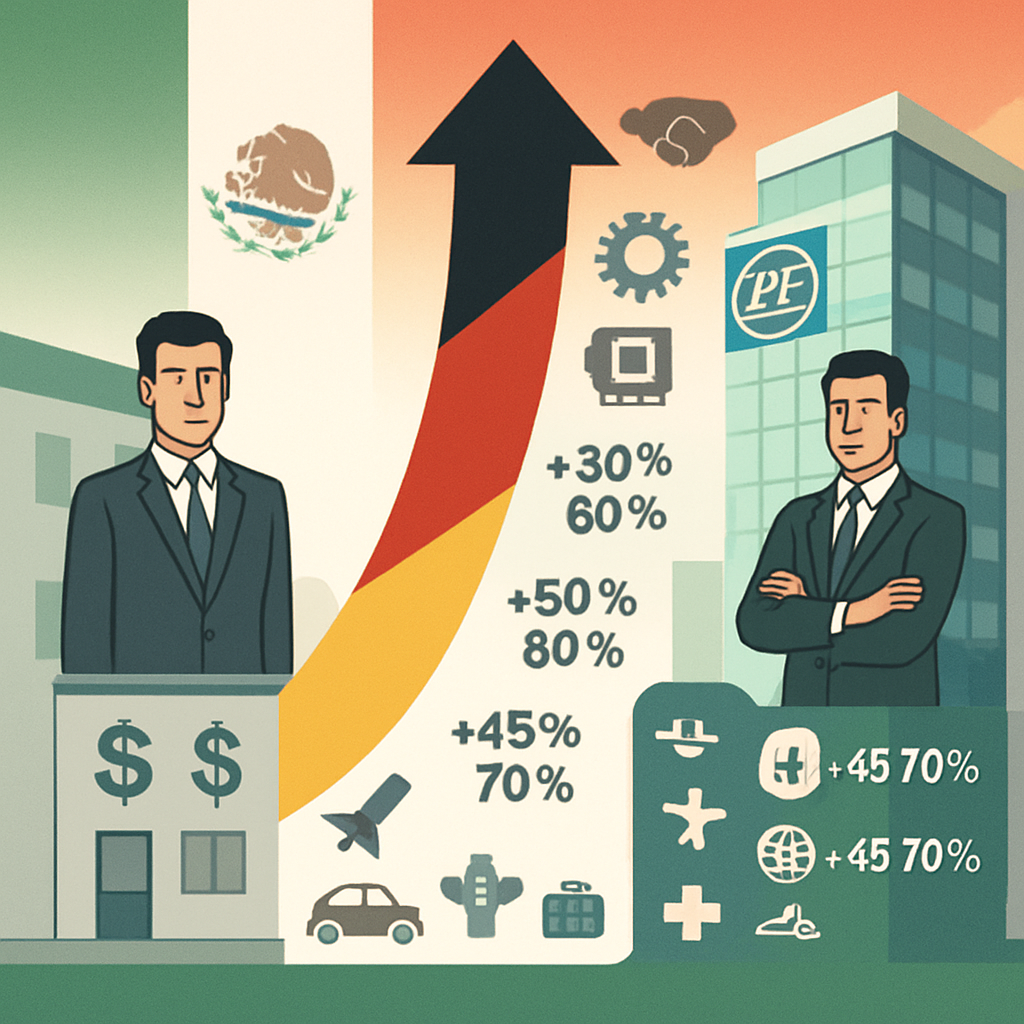
High-Value Qualifications for Mexico:
| German Certification | Mexican Market Value | Salary Premium |
|---|---|---|
| Industrial Mechanic | Manufacturing/Automotive | 40-60% above average |
| IT System Integration | Tech sector leadership | 50-80% premium |
| Precision Mechanics | Aerospace/Medical devices | 45-70% increase |
Strategic Return Planning:
Making the Decision: Is This Path Right for You?
Self-Assessment Checklist for Mexican Candidates
Before committing to the Ausbildung pathway, honestly evaluate your readiness across multiple dimensions:
Language and Cultural Readiness:
Financial and Personal Circumstances:
Professional Motivation Assessment:
Red Flags and Realistic Expectations
Warning Signs This Path Isn't For You:
Reality Check - Common Misconceptions:
Next Steps and Resource Compilation
Immediate Action Items (Next 30 Days):
Essential Resources for Mexican Applicants:
Timeline for Application Success:
Final Considerations:
The Ausbildung path represents a significant investment in your professional future. Success requires cultural adaptability, language commitment, and realistic expectations about the journey ahead. However, for Mexican engineers willing to embrace this challenge, it offers unparalleled practical skills, international experience, and career opportunities that traditional academic paths rarely provide.
Consider this pathway if you value hands-on expertise, international experience, and long-term career flexibility over immediate financial gains or status preservation.
Frequently Asked Questions
Question 1: Can I apply for Ausbildung if I already have an engineering degree from Mexico?
Absolutely! Having an engineering degree actually strengthens your application. German employers value your technical foundation and theoretical knowledge. You'll need to provide certified translations of your degree and transcripts through the ZAB (Central Office for Foreign Education). Many Mexican engineers use Ausbildung to specialize in specific German industrial practices, gain hands-on experience, and improve their German language skills. The combination of your Mexican engineering background plus German practical training makes you highly competitive in the European job market. Start the credential recognition process 6-8 months before applying, as it can take time.
Question 2: What German language level do I realistically need, and how long does it take to achieve it?
Most Ausbildung programs require B1-B2 German proficiency, with technical fields often accepting B1 initially. From zero German knowledge, expect 12-18 months of intensive study (20+ hours weekly) to reach B1. Consider online platforms like Babbel or Deutsche Welle, followed by intensive courses at Goethe Institut Mexico City or Guadalajara. Technical German vocabulary is crucial - focus on your field's terminology. Some companies offer language support during the first year. Budget $2,000-4,000 USD for quality language preparation, which is still far less than Mexican private university costs.
Question 3: How do I find and apply to companies offering Ausbildung positions from Mexico?
Start with major German industrial companies with Mexican operations like Volkswagen, Siemens, or BASF - they often have established pipelines. Use official portals like Ausbildung.de, IHK-Lehrstellenbörse, and Handwerkskammer websites. The German Chamber of Commerce in Mexico (CAMEXA) hosts networking events and job fairs. Apply 12-18 months in advance, as most Ausbildung positions start in August/September. Your application should include: CV (German format), motivation letter in German, certified degree translations, German language certificate, and references. Many companies conduct initial interviews via video call, making the process accessible from Mexico.
Question 4: What are the real monthly living costs during Ausbildung, and is the salary enough?
Ausbildung salaries range from €515-1,200 monthly depending on the field and year (increases annually). In smaller German cities, you can live comfortably on this amount. Budget breakdown: €300-500 rent (shared apartment), €200-250 food, €100 transportation, €100 miscellaneous. Many apprentices qualify for BAföG (government assistance) or Wohngeld (housing allowance), adding €200-400 monthly. Choose locations wisely - Munich and Frankfurt are expensive, while cities like Dresden, Leipzig, or Erfurt offer excellent programs at lower costs. Unlike Mexican students accumulating debt, you'll be earning while learning and building savings.
Question 5: Can I bring my family, and what visa requirements apply?
As an Ausbildung participant, you'll receive a residence permit for vocational training. Bringing family is possible but complex. Your spouse can apply for a family reunification visa and work permit, but you must prove adequate income (usually €1,200+ monthly after your first year). Children can attend German schools for free. However, many Mexican engineers recommend completing Ausbildung first, then bringing family when transitioning to full employment with higher salaries. The process requires proof of German language skills (A1 minimum) for family members and adequate housing space. Consider the 3-year timeline and plan accordingly.
Question 6: What happens after completing Ausbildung - am I guaranteed a job?
While there's no legal guarantee, employment rates for Ausbildung graduates exceed 85%. Many companies invest heavily in apprentices and prefer hiring their own graduates. You'll receive a recognized qualification equivalent to a skilled worker certificate, opening doors throughout the EU. Post-Ausbildung options include: immediate employment with your training company, pursuing Meister certification (master craftsman), studying at a Fachhochschule (applied sciences university), or starting your own business. Your Mexican engineering degree plus German Ausbildung creates a unique profile highly valued by international companies operating in Latin America.
Question 7: How does the application timeline work, and when should I start preparing?
Start preparation 18-24 months before your intended start date. Timeline: Months 1-12: Intensive German language learning; Months 13-15: Credential recognition and document preparation; Months 16-18: Company research and applications; Months 19-21: Interviews and visa processing; Months 22-24: Final preparations and arrival. Most Ausbildung programs start in August/September, with some February intakes. Apply to multiple companies and regions to increase your chances. Early preparation is crucial - rushed applications rarely succeed, and visa processing can take 3-6 months.
Question 8: Are there specific engineering fields where Mexican students have better acceptance rates?
Yes! Automotive technology, renewable energy, industrial mechanics, and automation technology show high acceptance rates for Mexican applicants. Germany values Mexico's strong manufacturing background, especially in automotive (thanks to companies like VW and Audi operating in Mexico). Mechatronics and electrical engineering Ausbildung programs actively seek international students. Chemical and pharmaceutical sectors also welcome Mexican engineers. Avoid oversaturated fields like IT or banking. Research regional specializations - Bavaria for automotive, North Rhine-Westphalia for chemicals, Baden-Württemberg for engineering. Your Mexican background in manufacturing gives you a significant advantage in these sectors.
Conclusion
The secret is out: Mexican engineers aren't just choosing Ausbildung by accident—they're making a calculated decision that's transforming their careers and financial futures. While traditional university paths in Mexico often lead to debt and theoretical knowledge without practical application, Germany's Ausbildung system offers something revolutionary: paid training, guaranteed employment, and hands-on expertise that employers actually value. The dual education model doesn't just teach you—it pays you to learn while building real-world skills that Mexican technical education systems like CONALEP and IPN simply can't match. This isn't about abandoning your engineering background; it's about leveraging it in a system designed for success.
The numbers don't lie: while Mexican students graduate with mounting debt and uncertain job prospects, Ausbildung participants earn from day one and graduate with job security in Europe's strongest economy. The cultural adaptability required may seem daunting, but thousands of international students have already proven that with proper guidance and preparation, this path isn't just possible—it's profitable. The German language barrier that stops many students is simply the first filter that separates those who dream from those who achieve.
Your next steps are clearer than ever: start researching Ausbildung programs that align with your engineering background today, begin gathering your documentation, and commit to German language learning immediately. Don't let another semester pass wondering "what if" while watching opportunities slip away. The Mexican engineers already in Germany didn't wait for perfect conditions—they created them through action.
Ready to join the ranks of successful Mexican professionals thriving in Germany? GoAusbildung's expert advisors are standing by to transform your uncertainty into a concrete action plan. We've guided hundreds of students through every step of this journey—from program selection to visa approval to your first day of paid training. Stop letting fear of the unknown keep you from the financial freedom and career security you deserve. Contact GoAusbildung today and discover why this path is exactly what forward-thinking students like you have been searching for. Your German success story starts with one decision—make it now.
About GoAusbildung
Comprehensive resource for guidance on Ausbildung programs in Germany
Ready to Start Your Ausbildung Journey in Germany?
Explore our resources and get personalized guidance to find the perfect Ausbildung program aligned with your career goals.